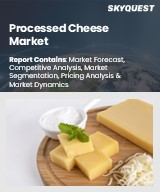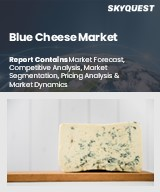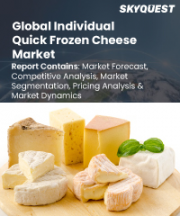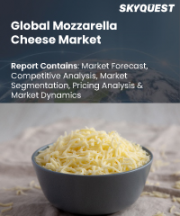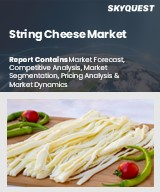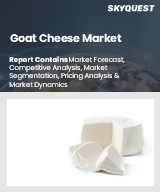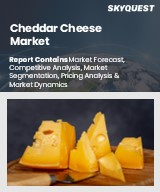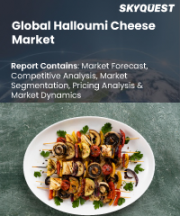
|
시장보고서
상품코드
1662725
저지방 치즈 시장 예측( -2030년) : 제품별, 유통 채널별, 용도별, 지역별 세계 분석Low-Fat Cheese Market Forecasts to 2030 - Global Analysis By Product, Distribution Channel, Application and By Geography |
||||||
Stratistics MRC에 따르면, 세계 저지방 치즈 시장은 2024년에 1,154억 달러로 2030년에는 1,591억 2,000만 달러에 달할 것으로 예측되며, 예측 기간 동안 5.5%의 CAGR을 기록할 것으로 예상됩니다. 저지방 치즈는 기존 치즈를 대체할 수 있는 건강한 대안으로, 치즈 애호가들이 선호하는 풍부한 풍미와 크림 같은 질감은 그대로 유지하면서 지방 함량을 줄인 제품입니다. 이 치즈는 탈지 우유 또는 부분 탈지 우유를 사용하여 칼로리와 포화 지방의 양을 크게 줄였습니다. 건강을 염려하고 체중, 콜레스테롤, 음식에서 섭취하는 지방의 양을 조절하고 싶은 분들에게 적합한 선택입니다. 또한 저지방 치즈는 샐러드, 샌드위치, 구운 식품 등 다양한 음식에 첨가할 수 있습니다. 슬라이스, 블록, 스프레드 형태로 제공됩니다.
미국심장협회(AHA)에 따르면 포화지방산 섭취를 줄이기 위해 저지방 치즈를 심장에 좋은 식단의 일부로 권장하고 있으며, 온스당 지방 함량이 3g 이하, 포화지방 함량이 1g 이하인 저지방 치즈를 선택할 것을 권장하고 있습니다.
기능성 식품에 대한 관심 증가
기본적인 영양 보충뿐만 아니라 더 많은 건강 효과를 가져다주는 기능성 식품에 대한 수요가 증가하고 있습니다. 저지방 치즈는 고단백, 고칼슘이면서 저지방이기 때문에 근육량 유지, 뼈 건강 증진, 균형 잡힌 식습관 유지를 원하는 사람들에게 적합합니다. 또한, 과체중을 유발하지 않으면서도 영양가가 높아 건강을 염려하는 부모들 사이에서 이유식 식단에 자주 사용되는 식재료로 선호되고 있습니다.
맛과 식감의 과제
저지방 치즈가 전지방 치즈보다 맛과 질감이 떨어진다는 생각은 저지방 치즈가 널리 받아들여지는 것을 방해하는 주요 장애물 중 하나입니다. 지방을 줄이면 치즈의 풍미, 크리미함, 녹는 정도에 영향을 미치는 경우가 많습니다. 또한, 저지방 치즈는 전통적인 치즈 제품과 비교할 때 매력적이지 않으며, 기술의 발전으로 이러한 품질이 시대에 따라 개선되고 있음에도 불구하고 많은 소비자들이 여전히 맛과 즐거움이 떨어진다고 생각하기 때문입니다.
효과적인 대체 식품에 대한 관심 증가
전 세계적으로 건강에 대한 관심이 높아짐에 따라 맛은 그대로 유지하면서 영양을 개선한 식품에 대한 수요가 증가하고 있습니다. 저지방 치즈는 심장 건강과 체중 조절을 위해 고단백, 저칼로리 식품을 찾는 소비자들에게 어필할 수 있는 저지방 치즈는 이러한 트렌드에서 이익을 얻을 수 있는 좋은 위치에 있습니다. 또한, 운동선수, 피트니스 애호가, 식단 조절을 하는 사람들 등 더 건강한 식품을 적극적으로 찾는 특정 소비자 그룹을 공략하면 시장은 더욱 성장할 수 있습니다.
유제품 부문의 치열한 경쟁
저지방 치즈 시장에서는 기존 전지방 치즈 제조업체와 식물성 치즈 제조업체가 주요 경쟁자입니다. 저지방 치즈 제품을 돋보이게 하는 것은 어렵습니다. 또한, 식물성 치즈와 비건 치즈의 인기가 높아지면서 시장 경쟁이 치열해져 저지방 치즈 생산자가 시장 점유율을 유지하고 건강 지향적 인 고객을 끌어들이는 것이 더 어려워지고 있습니다.
COVID-19의 영향
저지방 치즈 시장은 COVID-19의 대유행으로 인해 다양한 영향을 받았습니다. 첫째, 공급망의 혼란과 소비자의 우선순위 변화가 매출에 영향을 미쳤습니다. 물류 문제와 가동 중단으로 인해 생산과 배송이 지연되면서 많은 소비자들이 건강한 대안보다 매혹적인 완전 지방 치즈를 선택하고 편안한 음식에 의존했습니다. 치즈와 같은 건강하고 저지방 식품에 대한 수요는 전염병이 유행하면서 면역력과 건강에 대한 인식이 높아짐에 따라 증가했습니다. 또한, E-Commerce와 가정 요리로의 전환은 저지방 치즈 브랜드가 건강 지향적인 소비자와 연결되는 계기가 되어 초기 후퇴를 상쇄하고 완만한 시장 회복의 길을 열었습니다.
예측 기간 동안 모짜렐라 스틱 부문이 가장 클 것으로 예상됩니다.
모짜렐라 스틱 시장은 예측 기간 동안 가장 큰 시장 점유율을 차지할 것으로 예상됩니다. 모짜렐라는 순한 맛과 다양한 요리, 특히 샌드위치, 샐러드, 피자 등 다양한 요리에 널리 사용되기 때문에 인기가 높습니다. 기존 치즈에 비해 지방 함량이 적기 때문에 건강을 중시하는 소비자들에게도 인기가 있습니다. 또한, 저지방 치즈 시장에서 모짜렐라 치즈의 우위는 건강한 식단에 대한 수요 증가와 이탈리아 요리의 세계적인 매력에 기인합니다. 또한, 모짜렐라 치즈는 조각, 블록, 스트링 형태로 제공되기 때문에 외식업체와 소매업체에 매우 편리합니다.
예측 기간 동안 온라인 부문이 가장 높은 CAGR을 보일 것으로 예상됩니다.
예측 기간 동안 온라인 부문이 가장 높은 성장률을 보일 것으로 예상됩니다. 저지방 치즈는 E-Commerce 플랫폼의 급속한 확장과 소비자의 편의성에 대한 욕구 증가로 인해 온라인 구매가 증가하고 있습니다. 온라인 플랫폼은 다양한 제품 옵션, 경쟁력 있는 가격, 문 앞까지 배송을 제공함으로써 건강을 중시하는 고객의 바쁜 라이프스타일에 대응하고 있습니다. 또한, 저지방 치즈 구매를 위한 온라인 채널의 인기가 높아지는 것은 E-Commerce가 종합적인 제품 정보, 고객 리뷰, 프로모션 혜택을 제공할 수 있는 능력을 갖추고 있기 때문이기도 합니다.
가장 큰 점유율을 차지하는 지역
예측 기간 동안 북미가 가장 큰 시장 점유율을 차지할 것으로 예상됩니다. 이 지역에서는 비만과 심장병에 대한 우려와 건강 및 웰빙에 대한 관심이 높아지면서 저지방 및 저칼로리 치즈 옵션의 인기가 높아지고 있습니다. 특히 미국은 저지방 치즈의 혁신 수준이 높고, 소매점 및 외식 채널에서 저지방 치즈를 광범위하게 사용할 수 있기 때문에 이 시장에서 중요한 역할을 하고 있습니다. 또한, 이 지역은 정교한 유통망과 확립된 유제품 생산 시스템의 혜택을 누리고 있어 시장 점유율을 더욱 높이고 있습니다.
CAGR이 가장 높은 지역
예측 기간 동안 아시아태평양은 가장 높은 CAGR을 보일 것으로 예상됩니다. 소비자의 취향이 건강식으로 변화하고 유럽과 미국의 식습관이 중국, 인도, 일본 등의 국가에 영향을 미치면서 저지방 치즈의 선택이 점점 더 널리 퍼지고 있습니다. 이러한 추세는 이 지역의 중산층 증가, 도시화 진전, 가처분 소득 증가에 힘입은 바 큽니다. 또한, 많은 소비자들이 건강에 대한 관심이 높아지고 저지방 제품의 이점을 이해함에 따라 건강한 치즈 대체 식품에 대한 수요가 증가하고 있으며, 이는 아시아태평양 시장 확대의 원동력이 되고 있습니다.
무료 커스터마이징 서비스
본 보고서를 구독하는 고객은 다음과 같은 무료 맞춤화 옵션 중 하나를 이용할 수 있습니다.
- 기업 소개
- 추가 시장 진입 기업의 종합적인 프로파일링(최대 3개사까지)
- 주요 기업 SWOT 분석(3개사까지)
- 지역 세분화
- 고객의 관심에 따른 주요 국가별 시장 추정 및 예측, CAGR(주: 타당성 검토에 따른)
- 경쟁사 벤치마킹
- 제품 포트폴리오, 지리적 입지, 전략적 제휴를 통한 주요 기업 벤치마킹
목차
제1장 주요 요약
제2장 서문
- 개요
- 이해관계자
- 조사 범위
- 조사 방법
- 데이터 마이닝
- 데이터 분석
- 데이터 검증
- 조사 접근법
- 조사 정보 출처
- 1차 조사 정보 출처
- 2차 조사 정보 출처
- 가정
제3장 시장 동향 분석
- 소개
- 성장 촉진요인
- 성장 억제요인
- 기회
- 위협
- 제품 분석
- 용도 분석
- 신흥 시장
- COVID-19의 영향
제4장 Porter's Five Forces 분석
- 공급 기업의 교섭력
- 구매자의 교섭력
- 대체품의 위협
- 신규 참여업체의 위협
- 경쟁 기업 간의 경쟁 관계
제5장 세계의 저지방 치즈 시장 : 제품별
- 소개
- 페타치즈
- 리코타
- 모차렐라 스틱
- 하드 치즈
- 체다
- 파르메산
제6장 세계의 저지방 치즈 시장 : 유통 채널별
- 소개
- 푸드서비스
- 소매
- 하이퍼마켓과 슈퍼마켓
- 편의점
- 온라인
- 기타
제7장 세계의 저지방 치즈 시장 : 용도별
- 소개
- 비스킷
- 스낵
- 수프
- 소스
- 기타
제8장 세계의 저지방 치즈 시장 : 지역별
- 소개
- 북미
- 미국
- 캐나다
- 멕시코
- 유럽
- 독일
- 영국
- 이탈리아
- 프랑스
- 스페인
- 기타 유럽
- 아시아태평양
- 일본
- 중국
- 인도
- 호주
- 뉴질랜드
- 한국
- 기타 아시아태평양
- 남미
- 아르헨티나
- 브라질
- 칠레
- 기타 남미
- 중동 및 아프리카
- 사우디아라비아
- 아랍에미리트
- 카타르
- 남아프리카공화국
- 기타 중동 및 아프리카
제9장 주요 개발
- 계약, 파트너십, 협업, 합작투자
- 인수와 합병
- 신제품 발매
- 사업 확대
- 기타 주요 전략
제10장 기업 개요
- Danone S.A.
- Arla Foods, Inc
- Kraft Heinz Company
- Nestle S.A.
- General Mills Inc.
- Sargento Foods Inc.
- Amul Limited
- Land O'Lakes, Inc
- Unilever N.V.
- Dairy Farmers of America, Inc.
- Leprino Foods Company
- Kerry Group
- Schreiber Foods Inc.
- Conagra Brands, Inc.
- Lactalis Group
According to Stratistics MRC, the Global Low-Fat Cheese Market is accounted for $115.40 billion in 2024 and is expected to reach $159.12 billion by 2030 growing at a CAGR of 5.5% during the forecast period. Low-fat cheese is a healthier alternative to traditional cheese, offering a reduced fat content while retaining much of the rich flavour and creamy texture that cheese lovers enjoy. Skimmed or partially skimmed milk is used to make this kind of cheese, which drastically reduces the amount of calories and saturated fats. It is the best option for people who are concerned about their health and want to control their weight, cholesterol, or total intake of fat from food. Moreover, low-fat cheese can be added to a variety of foods, including salads, sandwiches, and baked goods. It comes in slices, blocks, and spreads.
According to the American Heart Association (AHA) recommends low-fat cheese as part of a heart-healthy diet to reduce saturated fat intake. They suggest choosing low-fat cheeses with no more than 3 grams of fat per ounce and no more than 1 gram of saturated fat per ounce.
Market Dynamics:
Driver:
Rising interest in functional foods
Demand is rising for functional foods that offer more health benefits than just basic nourishment. Low-fat cheese, which has a high protein and calcium content but a low fat content, is a great choice for people who want to maintain muscle mass, improve bone health, or maintain a balanced diet. Additionally, it has also become a favorite ingredient for kids' meals among health-conscious parents, who like that it offers nutritional benefits without being overly fattening.
Restraint:
Challenges with taste and texture
The idea that low-fat cheese tastes and feels less good than full-fat cheese is one of the main obstacles preventing it from becoming widely accepted. Fat reduction frequently affects cheese's flavor, creaminess, and meltability-three important qualities that customers appreciate. Furthermore, when compared to traditional cheese products, low-fat cheese is less appealing because many consumers still believe it to be less tasty or pleasurable, even though technological advancements have improved these qualities over time.
Opportunity:
Growing interest in effective food substitutes
The demand for food products that provide improved nutritional profiles without sacrificing taste is growing as global health consciousness continues to rise. Since low-fat cheese appeals to consumers looking for high-protein, low-calorie options that promote heart health and weight management, it is well-positioned to profit from this trend. Moreover, by reaching out to particular consumer groups, like athletes, fitness enthusiasts, and people with dietary restrictions who are actively searching for healthier food options, the market can grow even more.
Threat:
Tough competition in the dairy sector
Traditional full-fat cheese producers and plant-based cheese producers are major rivals in the low-fat cheese market. Shelf space is frequently dominated by well-known dairy brands with a sizable market share, making it challenging for low-fat cheese products to stand out. Additionally, the competition has gotten fiercer due to the growing popularity of plant-based and vegan cheese alternatives, making it harder for producers of low-fat cheese to hold onto market share and draw in health-conscious customers.
Covid-19 Impact:
The market for low-fat cheese was affected by the COVID-19 pandemic in a number of ways. First, supply chain disruptions and changes in consumer priorities affected sales. Logistics issues and lockdowns delayed production and delivery, and many consumers resorted to comfort foods, choosing decadent, full-fat cheese over healthier alternatives. The demand for wholesome, low-fat food items, like cheese, increased as the pandemic spread due to increased awareness of immunity and health. Furthermore, the move to e-commerce and home cooking also gave low-fat cheese brands a chance to connect with health-conscious consumers, cancelling out the initial setbacks and paving the way for a slow market recovery.
The Mozzarella Sticks segment is expected to be the largest during the forecast period
The Mozzarella Sticks segment is expected to account for the largest market share during the forecast period. Mozzarella is a popular choice because of its mild flavor, versatility, and widespread use in a variety of cuisines, especially in sandwiches, salads, and pizzas. It is a popular choice for consumers who are health-conscious because of its reduced fat content when compared to traditional cheeses. Moreover, mozzarella's dominance in the low-fat cheese market can be attributed to both the growing demand for healthier eating options and the global appeal of Italian cuisine. It is also very convenient for foodservice providers and retail customers because it comes in shredded, block, and string forms.
The Online segment is expected to have the highest CAGR during the forecast period
Over the forecast period, the Online segment is predicted to witness the highest growth rate. Low-fat cheese is increasingly being bought online by consumers due to the quick expansion of e-commerce platforms and their growing desire for convenience. Online platforms serve the hectic lifestyles of health-conscious customers by providing a wide range of product options, competitive pricing, and doorstep delivery. Additionally, the growing popularity of online channels for buying low-fat cheese can also be attributed to e-commerce's capacity to deliver comprehensive product information, customer reviews, and promotional offers.
Region with largest share:
During the forecast period, the North American region is expected to hold the largest market share. Low-fat and lower-calorie cheese options are becoming more popular in the region due to the strong emphasis on health and wellness trends as well as growing worries about obesity and heart disease. Due to its high level of innovation in low-fat cheese varieties and its extensive availability across retail and foodservice channels, the United States, in particular, plays a significant role in this market. Furthermore, the area also gains from sophisticated distribution networks and well-established dairy production systems, which increase its market share even more.
Region with highest CAGR:
Over the forecast period, the Asia-Pacific region is anticipated to exhibit the highest CAGR. Low-fat cheese options are becoming more and more popular as consumer preferences change toward healthier options and Western dietary practices continue to have an impact on nations like China, India, and Japan. This trend is being fuelled by the region's growing middle class, growing urbanization, and rising disposable incomes. Additionally, the demand for wholesome cheese substitutes is rising as more consumers become health-conscious and understand the advantages of low-fat products, which is driving the market's expansion in the Asia-Pacific area.
Key players in the market
Some of the key players in Low-Fat Cheese market include Danone S.A., Arla Foods, Inc, Kraft Heinz Company, Nestle S.A., General Mills Inc., Sargento Foods Inc., Amul Limited, Land O' Lakes, Inc, Unilever N.V., Dairy Farmers of America, Inc., Leprino Foods Company, Kerry Group, Schreiber Foods Inc., Conagra Brands, Inc. and Lactalis Group.
Key Developments:
In May 2024, European dairy cooperative Arla Foods has signed a licensing agreement with snacks company Mondelez International to produce, distribute and market chocolate milk under the Milka brand in Germany, Austria and Poland. Arla Foods is expanding its portfolio with the addition of one of the most popular chocolate brands around.
In May 2024, Kraft Heinz Canada and Highbury Canco announced the extension of their partnership agreement in Leamington for another four years, with the production deal now in place until the end of 2027. Today's announcement marks the third consecutive extension in the longstanding partnership between the two organizations in Southern Ontario, a connection that has served to support jobs and bolster the local economy.
In January 2024, French food group Danone, opens new tab said on it had signed an agreement to sell its premium organic dairy units in the United States to investment firm Platinum Equity.The sale of the Horizon Organic and Wallaby businesses is part of the company's portfolio review and asset rotation program the company announced in March 2022, Danone said in a statement, without disclosing the financial details of the deal.
Products Covered:
- Feta
- Ricotta
- Mozzarella Sticks
- Hard Cheese
- Cheddar
- Parmesan
Distribution Channels Covered:
- Food Service
- Retail
- Hypermarkets & Supermarkets
- Convenience Stores
- Online
- Other Distribution Channels
Applications Covered:
- Biscuits
- Snacks
- Soups
- Sauces
- Other Applications
Regions Covered:
- North America
- US
- Canada
- Mexico
- Europe
- Germany
- UK
- Italy
- France
- Spain
- Rest of Europe
- Asia Pacific
- Japan
- China
- India
- Australia
- New Zealand
- South Korea
- Rest of Asia Pacific
- South America
- Argentina
- Brazil
- Chile
- Rest of South America
- Middle East & Africa
- Saudi Arabia
- UAE
- Qatar
- South Africa
- Rest of Middle East & Africa
What our report offers:
- Market share assessments for the regional and country-level segments
- Strategic recommendations for the new entrants
- Covers Market data for the years 2022, 2023, 2024, 2026, and 2030
- Market Trends (Drivers, Constraints, Opportunities, Threats, Challenges, Investment Opportunities, and recommendations)
- Strategic recommendations in key business segments based on the market estimations
- Competitive landscaping mapping the key common trends
- Company profiling with detailed strategies, financials, and recent developments
- Supply chain trends mapping the latest technological advancements
Free Customization Offerings:
All the customers of this report will be entitled to receive one of the following free customization options:
- Company Profiling
- Comprehensive profiling of additional market players (up to 3)
- SWOT Analysis of key players (up to 3)
- Regional Segmentation
- Market estimations, Forecasts and CAGR of any prominent country as per the client's interest (Note: Depends on feasibility check)
- Competitive Benchmarking
- Benchmarking of key players based on product portfolio, geographical presence, and strategic alliances
Table of Contents
1 Executive Summary
2 Preface
- 2.1 Abstract
- 2.2 Stake Holders
- 2.3 Research Scope
- 2.4 Research Methodology
- 2.4.1 Data Mining
- 2.4.2 Data Analysis
- 2.4.3 Data Validation
- 2.4.4 Research Approach
- 2.5 Research Sources
- 2.5.1 Primary Research Sources
- 2.5.2 Secondary Research Sources
- 2.5.3 Assumptions
3 Market Trend Analysis
- 3.1 Introduction
- 3.2 Drivers
- 3.3 Restraints
- 3.4 Opportunities
- 3.5 Threats
- 3.6 Product Analysis
- 3.7 Application Analysis
- 3.8 Emerging Markets
- 3.9 Impact of Covid-19
4 Porters Five Force Analysis
- 4.1 Bargaining power of suppliers
- 4.2 Bargaining power of buyers
- 4.3 Threat of substitutes
- 4.4 Threat of new entrants
- 4.5 Competitive rivalry
5 Global Low-Fat Cheese Market, By Product
- 5.1 Introduction
- 5.2 Feta
- 5.3 Ricotta
- 5.4 Mozzarella Sticks
- 5.5 Hard Cheese
- 5.6 Cheddar
- 5.7 Parmesan
6 Global Low-Fat Cheese Market, By Distribution Channel
- 6.1 Introduction
- 6.2 Food Service
- 6.3 Retail
- 6.4 Hypermarkets & Supermarkets
- 6.5 Convenience Stores
- 6.6 Online
- 6.7 Other Distribution Channels
7 Global Low-Fat Cheese Market, By Application
- 7.1 Introduction
- 7.2 Biscuits
- 7.3 Snacks
- 7.4 Soups
- 7.5 Sauces
- 7.6 Other Applications
8 Global Low-Fat Cheese Market, By Geography
- 8.1 Introduction
- 8.2 North America
- 8.2.1 US
- 8.2.2 Canada
- 8.2.3 Mexico
- 8.3 Europe
- 8.3.1 Germany
- 8.3.2 UK
- 8.3.3 Italy
- 8.3.4 France
- 8.3.5 Spain
- 8.3.6 Rest of Europe
- 8.4 Asia Pacific
- 8.4.1 Japan
- 8.4.2 China
- 8.4.3 India
- 8.4.4 Australia
- 8.4.5 New Zealand
- 8.4.6 South Korea
- 8.4.7 Rest of Asia Pacific
- 8.5 South America
- 8.5.1 Argentina
- 8.5.2 Brazil
- 8.5.3 Chile
- 8.5.4 Rest of South America
- 8.6 Middle East & Africa
- 8.6.1 Saudi Arabia
- 8.6.2 UAE
- 8.6.3 Qatar
- 8.6.4 South Africa
- 8.6.5 Rest of Middle East & Africa
9 Key Developments
- 9.1 Agreements, Partnerships, Collaborations and Joint Ventures
- 9.2 Acquisitions & Mergers
- 9.3 New Product Launch
- 9.4 Expansions
- 9.5 Other Key Strategies
10 Company Profiling
- 10.1 Danone S.A.
- 10.2 Arla Foods, Inc
- 10.3 Kraft Heinz Company
- 10.4 Nestle S.A.
- 10.5 General Mills Inc.
- 10.6 Sargento Foods Inc.
- 10.7 Amul Limited
- 10.8 Land O' Lakes, Inc
- 10.9 Unilever N.V.
- 10.10 Dairy Farmers of America, Inc.
- 10.11 Leprino Foods Company
- 10.12 Kerry Group
- 10.13 Schreiber Foods Inc.
- 10.14 Conagra Brands, Inc.
- 10.15 Lactalis Group






